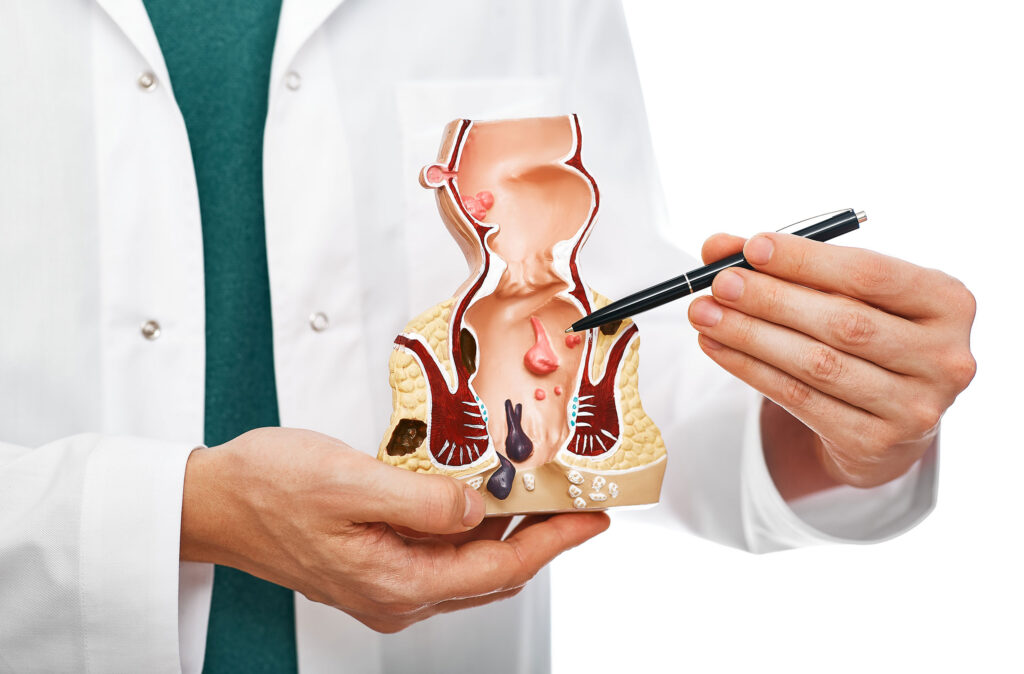Because they can cause frightening symptoms such as bleeding from the anus, many people wonder, “Are hemorrhoids dangerous?” These inflamed blood vessels that form in or around the rectum and anus typically do not pose a serious health risk. Rather, most hemorrhoid symptoms are merely intrusive and interfere with your quality of life.

But what happens if you don’t treat them? This post explains what happens if you leave them untreated, highlights the potential dangers of bleeding hemorrhoids, and provides information on treatment for severe cases.
While hemorrhoids can be very uncomfortable and cause serious complications, they cannot kill you. Untreated, they may start bleeding, and, if irritation persists, the swollen blood vessels could burst, but that would still not create a life-threatening situation.
Some hemorrhoids may develop an internal blood clot (a condition referred to as thrombosed hemorrhoids.) In such cases, you could experience pain simply from sitting, stretching, or walking.
Finally, internal hemorrhoids may protrude from the anus (referred to as prolapsing). If the anal muscles tighten around the prolapsed hemorrhoid, its blood flow could be restricted, resulting in strangulation and more discomfort. While all these complications can be very painful and worrisome, they are still not deadly.
If you’ve experienced rectal bleeding, or noticed blood in your stool due to hemorrhoids, you may wonder, “can you bleed out from hemorrhoids?” While you cannot, if bleeding is heavy and left untreated, you could develop anemia, a condition in which you don’t have enough red blood cells to distribute oxygen throughout your body.
Are hemorrhoids dangerous if left untreated? These swollen vessels in or around the rectum and anus rarely pose a serious health threat. But if left untreated, they may cause complications such as thrombosed, prolapsed, or strangulated hemorrhoids. Untreated, they may also bleed enough to make you anemic.
Additionally, hemorrhoids can impact your daily life, making it difficult for you to comfortably sit, concentrate at work, or engage in your favorite physical activities. In this scenario, it may be more difficult to maintain personal hygiene and keep yourself clean after passing a bowel movement.
Having this condition may also impact your bowel habits, contributing to constipation or even causing bowel incontinence.
Finally, your mental health may be impacted by your condition, as you experience the disruptions of symptoms such as pain, itching and bleeding from the rectum.
Mild cases may resolve on their own within a few days, especially with lifestyle modifications. For example, increasing your fluid and fiber intake can soften your stool and reduce pressure on your lower rectum.
You can also try to engage in more physical activity, since remaining sedentary is a known risk factor for hemorrhoids.
However, you should see a doctor if:
Symptomatic grade 2-3 internal hemorrhoids can respond to non-surgical hemorrhoids treatment options such as Hemorrhoid Artery Embolization. This minimally invasive procedure, available at the Texas Hemorrhoid Institute, shrinks them and reduces your symptom burden by cutting off blood supply to the swollen arteries.
So, are hemorrhoids dangerous? While they won’t kill you, they can take a toll on your quality of life and could cause serious complications. Seeking treatment can help provide relief, so request a consultationrequest a consultationrequest a consultation with our specialists today.

Scheduling
Please contact our dedicated specialists to schedule a consultation today.
2025 Texas Hemorrhoid Institute. All rights reserved. Website Design by Healthcare Success